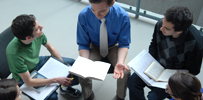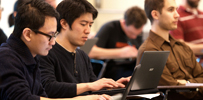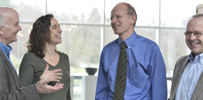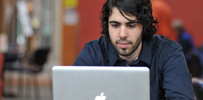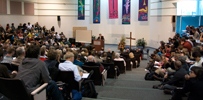Introducing Scholar-in-Residence Jessamin Birdsall
.jpg)
Dr. Jessamin Birdsall came to Regent as a student in Fall 2022. After completing the requirements for a Graduate Diploma in Christian Studies, she transitioned into the role of Scholar-in-Residence for the Winter 2024 term.
Jessamin holds a PhD in Sociology and Social Policy from Princeton University and has worked in the fields of international development and community development in India, the United Kingdom, and the United States. Her sociological research focuses on religion, race and ethnicity, and inequality. Jessamin is the co-author (with Jason Roach) of Healing the Divides: How Every Christian Can Advance God’s Vision for Racial Unity and Justice (The Good Book Company, 2022; also available in Kindle edition).
Jessamin has contributed greatly to the Regent community since her arrival a year and a half ago. In addition to sharing prayer, care, and hospitality with other students, staff, and faculty, Jessamin has contributed her sociological expertise to ongoing conversations around race, ethnicity, and belonging within the College.
In the following interview, Jessamin shares about her journey to Regent, her student experience and current role, and the relationship between theology and sociology.
If you'd like to support students and scholars like Jessamin, please consider donating to Regent's 2024 Spring Appeal. Your gift will help keep Regent accessible and affordable to students far into the future!
Not many people double back to take master’s-level courses after earning a doctorate in another subject. What contributed to that decision for you, and what has studying at Regent been like?
One of my main motivations for coming to Regent was a desire to get a more solid biblical and theological foundation—partly for my own personal formation and walk with the Lord, and partly because I knew it would be relevant to my work in sociology. I think sociology offers a very valuable set of tools for understanding our world, but there are a lot of questions it doesn't answer. What does it mean to be a fully human person? How do we deal with the realities of sin? How do we pursue justice in a way that isn't just driven by a particular political agenda or trend, but is rooted in biblical, historical, orthodox truth?
The Bible has a lot to say about the issues I’m interested in as a sociologist. I wanted to get a fuller understanding of Scripture and to be better equipped to integrate the truth of Scripture into my own reflection, research, and teaching. It’s important to me to draw on both sociological insights and biblical truth as I think about big topics such as identity, justice, race and ethnicity, immigration, and so on.
At Regent, I’ve really benefited from high-quality teaching in Old and New Testament, exegesis, hermeneutics, theology, and history. I now feel much better equipped to read Scripture, to interpret Scripture, and to apply Scripture to the major social issues of our time.
This fall I’ll start a job teaching sociology to Christian undergraduates. I didn’t anticipate this when I came to Regent, but now I can see how God has used my secular sociological training and my time at Regent to prepare me for that job, where I’ll be trying to help my students do this same work of integration. I’m very thankful for that.
How have you experienced Regent community life?
Regent is not just about transmitting theological ideas, but very much about holistic formation of people. That’s part of what drew me here.
One thing I’ve been struck by is the care and hospitality my husband and I have received from Regent faculty. I’ve had good interactions with faculty at previous institutions, but here faculty take an interest in us as more than just students doing intellectual labor. They want to know about other dimensions of our lives, they offer to pray for us, they open their homes. I think that’s unique and very valuable.
Another thing I’ve appreciated is the opportunity to build friendships with people of different ages, vocational backgrounds, theological traditions, nationalities, ethnicities. I’ve been both challenged and blessed by friends who have had a very different experience of the world than I have.
I’m grateful for the way Regent builds things like chapel, soup group, and retreats into the life of the community. What happens inside the classroom is important for shaping the way that we think about Scripture and culture, but it’s those other conversations and relationships where we really work out the implications of what we're learning and the difference it makes for our personal lives, our churches, the different sectors where we work.
Could you share a bit about your involvement in some ongoing conversations and initiatives at Regent related to race, ethnicity, and belonging?
The Regent community has lots of strengths and wonderful aspects, but—like any community—it also has areas for growth and change. One of those is around more fully living out our identity as a global and ethnically diverse community. The church throughout the ages has struggled to figure out how to genuinely practice unity and diversity in the gospel, so this is an area where we need the Lord's help to grow.
My experience as a missionary kid and my research as a sociologist have given me a heart for working within Christian communities and institutions to foster a culture where people of all ethnic and racial identities can genuinely belong and contribute and grow. I think it was because of this background and expertise that I was invited into what we’ve been calling an “active listening process” in this area.
I’ve been encouraged that Regent has recognized that this is an area for growth and change. By the time I got here, the Dean of Students office had done a survey on student attitudes and experiences and was planning an event called Wisdom of Each Other, a structured time of sharing and conversation related to race and ethnicity as they pertain to belonging at Regent. I helped to plan and facilitate that event, along with several other students, staff, and faculty, and I’ve been participating in a variety of follow-up conversations and activities. I feel privileged to be part of a group of people who are exploring ways to continue and deepen Regent's engagement with these kinds of issues, and to do so in a way that reflects God’s heart.
This term you’re at Regent not as a student but as a Scholar-in-Residence. What does that involve?
Basically, Regent is giving me the opportunity to focus on some research and writing projects while continuing to interact with faculty and the rest of the community here. Right now, I'm writing about a couple of projects that I started during my PhD program. One of those is focused on racial and ethnic diversity in the British evangelical church, and the other looks at evangelical engagement in American politics.
In your experience, what does sociology have to offer a place like Regent, or the church in general?
Good question! My view is that sociology is an important discipline for the church to engage with. It gives us research methods and empirical data about what's happening on the ground, and provides ways of thinking about social and cultural change that yield a lot of valuable insights. Churches can apply some of those tools and insights to the ways we communicate and live out the gospel in a very complex world. Sociology doesn't have all the answers, but the integration of theological truths and sociological insight—that’s a powerful aid to the church and the work we’re trying to do.
Jessamin's story highlights the importance of the Regent student experience. Every year, Regent relies on support from donors like you to make that experience possible—and affordable—for our students. Would you make a gift today?
